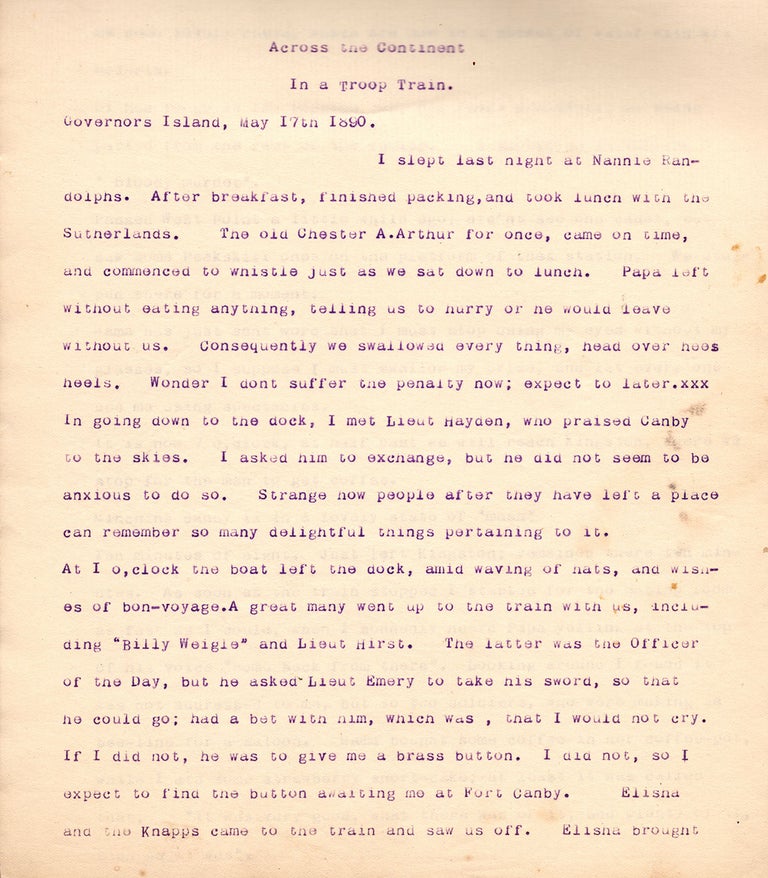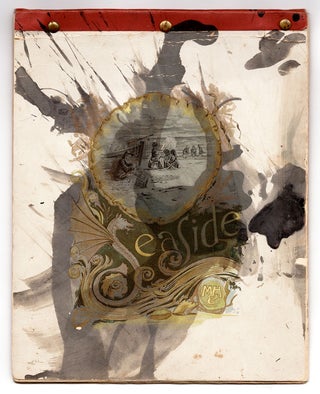Across the Continent in a Troop Train.
Various places; Copied 17 May 1890. Governors Island, New York, 17 May 1890. 4to notepad (10” x 8”). [30] pp. of typescript. A few manuscript annotations. CONDITION: Front cover badly ink-stained, a few small stains to back cover; text very good, with no significant stains or losses.
.An 18 year-old Army belle’s account of traveling across America on a troop train with her father and mother .
Born in West Point, New York, Alice McCrea Tschappat (1870–1957) was the only child of Army Officer Tully McCrea (1839–1918) and Hariette Hale McCrea (1843–1917). Raised at various frontier posts, Tschappat later became an accomplished painter, having studied at the Art Students League of New York and the Hopkins Art School of San Francisco. Her works were often exhibited at galleries and some were adapted to illustrate military texts. Around the time of her marriage to Maj.-Gen. William H. Tschappat (1874–1955) in 1898, she was described as “a reigning belle in exclusive army circles. To her nature has been more than lavish. Endowed with rare personal beauty, she is gifted as an artist, and possesses a contralto voice of exquisite sweetness and rich quality … Devoted as she is to her art studies she has nevertheless found time for out-of-door amusements, and is a graceful rider and swimmer.” According to her obituary, she was allegedly captured by Indians at Fort Sill and was rescued by Army troops.
Alice’s father Tully McCrea was a member of the Class of 1862 at West Point, where he had been a roommate of Maj.-Gen. George A. Custer. McCrea served during the Civil War, commanding an artillery battery at the Battle of Gettysburg, and was wounded in action at Petersburg, Virginia in 1864. Alice’s nomadic childhood mirrored her father’s movements from post to post following the Civil War. From the 1870s to the 1880s, McCrea was garrisoned in Florida, Connecticut, present-day Oklahoma, Washington, D.C., California, the Dakotas and Washington State. During the Spanish-American War, he was appointed Lieut. Col. and in 1900 was made Colonel of the 6th Artillery. Alice’s post-marriage life likely followed that of her husband, who was variously stationed in Havana, Washington D.C. and the Philippines, and also taught at West Point, his alma mater.
McCrea makes this trip across the U.S. in the company of her father, mother, their dog Diogenes (‘Di’), other mothers with children, and the troops themselves. Her journal is filled with lively, often amusing commentary on her travels as well as her vivid day-dreaming, offering a revealing portrait of the life of an Army belle on the cusp of adulthood. She records many impressions of the people, places, and incidents she experiences during her journey, including one humorous moment when a little bugler boy attempts to ride Diogenes. Transferring trains multiple times over the course of the trip, McCrea passes through the following places (some of which she has visited before): West Point, Kingston, NY, Buffalo, Chicago, Iowa, Omaha, Wyoming, Fort Fred Steel, Utah, Nevada, California, Portland, OR, and finally Canby, Oregon.
As she reveals, her daily activity of writing a travelogue appears to have inspired others on the train to do the same. She notes in one instance how “the boys are very much interested in this diary, and keep coming to me to ask, did you put down, we have just passed such and such a river &c.” At one point she also makes note of how “All of the children are writing diaries now,” and are also writing letters to each other for amusement. Upon reaching California she writes that she is “a total wreck, wilting fast,” “I am nearly dead, I am so hot”—her only salvation being ice cream and lemonade “with ‘lots’ of ice.” In one entry she offers a snapshot of how she is beating the heat: “I have been sitting with the neck of my dress undone, shoes off, feet up on the opposite seat, sipping lemonade. Picture for an artist, isn’t it?” Her travelogue is not short on wit: “We heard a man talking of a railroad accident he had just been in; he told all about a little child who was mashed, and other pleasant things.” Her trip ends in Canby, Oregon, which she finds rainy and looking like “Goldsmiths Deserted village.”
SOME REPRESENTATIVE PASSAGES
17 May 1890 “A great many went up to the train with us, including ‘Billy Weigle,’ and Lieut. Hirst. The latter was the Officer of the Day, but he asked Lieut Emery to take his sword, so that he could go; had a bet with him, which was, that I would not cry. If I did not, he was to give me a brass button. I did not, so I expect to find the button awaiting me at Fort Canby.”
17 May 1890 “Passed West Point a little while ago; didn’t see one cadet, but saw some Peekskill ones on the platform of that station. We stopped there for a moment. Mama has just sent word that I must stop using my eyes without my glasses, so I suppose I must swallow my pride, and let every one see me using spectacles.”
17 May “Ten minutes of eight. Just left Kingston [New York]; remained there ten minutes. As soon as the train stopped I started for the eating room as fast as I could, where I suddenly heard Papa yelling at the top of his voice ‘come back from there.’ Looking around I found it was not addressed to me, but to two soldiers, who were making a bee-line for a saloon.”
18 May “We are away behind time; expect to reach Buffalo in about an hour… Mrs Brown is afraid that the children will outgrow their clothes before we reach Canby. The officers are thinking strongly of chartering a canal boat, as all the boats we have met and passed, have all caught up and gone ahead. This morning we stopped at Fairport, for the soldiers to get coffee, which was dreadful.”
18 May “Mr Jordan and I contemplated jumping off [the moving train], to find out how it felt; each wishes the other to lead, but as we are both so polite we are still waiting for each other.”
19 May “Have just left Chicago. We expected to have a real square meal there, for the ‘Nickle Plate’ man had telegraphed ahead for it. But what a breakfast that was. We waited and waited and finally they brought us some fried eggs, bread that was not baked, and steak, from, I presume, one of the cows from Noah’s ark.”
19 May “Mama feels very sorry because Aunt Sophy missed us; she was to have brought us a lunch basket. Isn’t it sad? I expect we will eat canned chicken and ham all the way out, but, such is life. The country is still flat, this morning it was very marshy, and I saw a great many wild ducks.”
20 May “A train, containing a portion of the 1st Artillery, on their way East, came into the station at Council Bluffs, about half an hour before we left. Some of the men came up and shook hands with Papa and Mama, and said ‘Where is Dimple’?” When they found out that I was Dimple they could hardly believe it; it made me feel very old. When the train left the station, the soldiers of the two regiments gave each other three cheers.”
20 May “How romantic! To be left alone on the prairie. I thought very seriously of doing it, but I have my diary to finish, and it would not have given me much to put down, ‘train went off and left me. I sat down on the track, waited in the roasting sun, and a gale of wind, for an hour; then train came back and picked me up, the Officials on said train looking as if they would like to ‘cuss’ me.’ Gracious!! What a scolding I got from Papa for daring to go on the back-platform.”
21 May “The Rockies agree with my appetite… The only thing that looks like civilization now, are the telegraph poles. The inhabitants of this region are the queerest I have ever seen; they make the funniest remarks. One man said ‘those are the fellows, who are going to stand up for marks.’ Their favorite question, is, ‘where are you going,’ and when told, they always say ‘phew.’” … If I lived in this dreadful desert, I would lay on my back, in the sage-brush, and look up at the sky all day. The train slowed up, just now, and we were informed that there was a wreck ahead. We expected something exciting, but were disappointed, as they had already built another track around the wreck for us to pass.”
21 May “We are going through Rock Springs, a mining town. They are coal mines, and I never saw such dirty looking men. It comforted me a little, as I thought I was about as dirty as possible, but I find I might be worse. George Francis Train is in a train behind us; he is endeavoring to get ahead of Nelly Bly, in the fast trip around the world. … At Green River saw some of the men of the 7th Infantry.”
22 May “Stopped at Wells, Nevada… There was an Indian camp at Wells, where we saw a good many squaws and pappooses. One mother had her baby’s head covered over, and would not show it, unless she was given twenty-five cents. … At Elco, Nevada, saw some more Indians, Shoshones, I believe. We all stood on the platform, and talked with some squaws; they were too funny for anything. One of them wishes to work upon our feelings by her voice, which she tried to make melancholy, I presume to get money from us; it was too comical, especially, as we could not understand a word she said.”
23 May “I do not know what kind of cattle we are carrying, but if they put pigs on, I will leave. It is an outrage having such a long train; as we are the tail end, and they go like the wind around curves, it may act as ‘snap the whip,’ and we will go spinning down a mountain. The men in the further cars seem to be very much interested as to our fate. I think that they would be charmed to see us go off. There is a soldier hanging out of every window. Each place we stop, we are taken for a circus.”
26 May “Mrs Reilly and I made a tour of the town; went into a candy store, and bought some soda water. Mrs R. had a little brandy left in a bottle, which she wished to dispose of, so she made a toddy for herself, and then one for each child, of hot water, flavored with a little brandy. While she was making it, Hester jumped and skipped around the halls, singing, ‘where’s my toddy, I want my toddy.’ I guess everyone in the house heard her, and they must think that we are a queer set. I am going to sit up until the theatre starts, for it is no use to go to bed now, as they are drumming the city up, with bands of music, and such music.”
REFERENCES: Alice Tchapacht (McCrea) at geni.com; The Lawton Constitution (Lawton, Oklahoma 19 Nov. 1957), p. 9; Lieutenant Tully McCrea at antietam.aotw.org; The San Francisco Call (San Francisco, California, 25 Sept. 1896), p. 8; William Harvey Tschappat at geni.com
Item #6686
Sold



